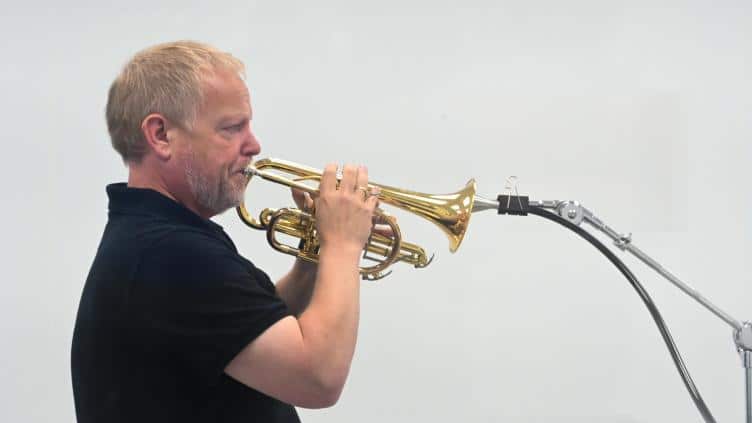UK brass bands say they’re safe to play
mainExperiments conducted by Brass Bands England suggest that their cornets and tubas are safer than previously thought.
Laboratory-based experiments took place in the clean room facilities of Modular Sterile Development, based in Rossendale, on Wednesday 1 July and involved a selection of instrumentalists. These included Russell Gray (cornet – pictured above taking part in experiments), Matt Routley (BBb tuba), Jef Sparkes (euphonium), Keith Muggeridge (baritone), Mark Peacock (cornet), Paul Coupe (trombone) and Chris Hardy (Eb tuba), performing in an environment similar to a hospital operating theatre and having particle emissions counted by sophisticated laser particle counting equipment that can measure particles and aerosols to 0.3 microns – around 250 times thinner than a human hair.
The particles released from a brass instrument are split into two categories – droplets and aerosols. Droplets are anything larger than 5 microns (a sixteenth of a human hair) in diameter, which fall to the ground quickly, while aerosols, are smaller than 5 microns and can’t be seen with the naked eye. These aerosol particles float on the air currents and can remain there for hours or even days. This ability to remain airborne for a long time is the reason aerosols pose such potential risks to brass bands, which often rehearse in poorly ventilated spaces. This study first looked at how many particles are released by various brass band instruments, ranging from cornet to BBb bass. While both aerosols and droplets were produced, far fewer droplets were seen than aerosols. The type of brass instrument didn’t change the number of particles released significantly and the likelihood is that the individual player makes more difference than the choice of instrument. However, the experiment also looked at the number of particles released when players breathe (without their instruments) and the results showed that observably fewer particles were produced when playing than when breathing alone….
Read on here.






did they check the puddles on the floor?
No need to do that. A towel or bucket works just fine. Could even add in a disinfecting solution. Brass players don’t have to be gross.
My thought exactly. That and all the breathing involved. Masks on bells???
The puddles are condensation. No risk. I wouldn’t drink it, but if that’s what you fancy…
Brass bands are all very well in their place – outdoors and several miles away.
Thomas Beecham
How snobby!
How chippy!
Their sound is not enjoyed by everyone, and there is no reason whatsoever why it should be.
Like bagpipes.
April 1st has come early or late, depending on your point of view
People who know how brass instruments work, and that they’re not like blowing out candles on a large birthday cake, were saying this weeks ago. Good to have it confirmed though.
Now how about woodwind intruments? Although they are generally shorter, I can’t imagine an oboe or a clarinet projecting particles any distance. Not so sure about the flute though.
I love the sound of brass bands.
As an old cornet player, I know they create lots of spit and even have a spit valve. I do find it hard to believe they are anywhere near safe in these covid days.
Except it’s not spit. It’s condensation.
It isn’ t only water.
https://www.researchgate.net/publication/274082538_Wind_Ensemble_Infectious_Disease_Risks_A_Microbiological_Examination_of_Water_Key_Liquids_in_Brass_Instruments
That is like tobacco companies testing cigarettes and deeming them safe. It is true that very little air leaves the bell of a brass instrument. What makes it dangerous to play in a BB is the fact that you have a lot of people in a small space together without masks. Saliva besides being all over the floor can also come out of the sides of the mouth while playing. Perhaps the most dangerous part of BB culture is going to the pub after rehearsals and concerts. I don’t think that the musicians would give that up.